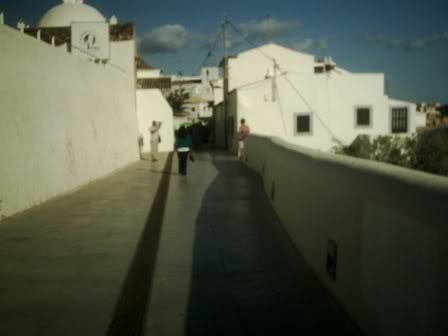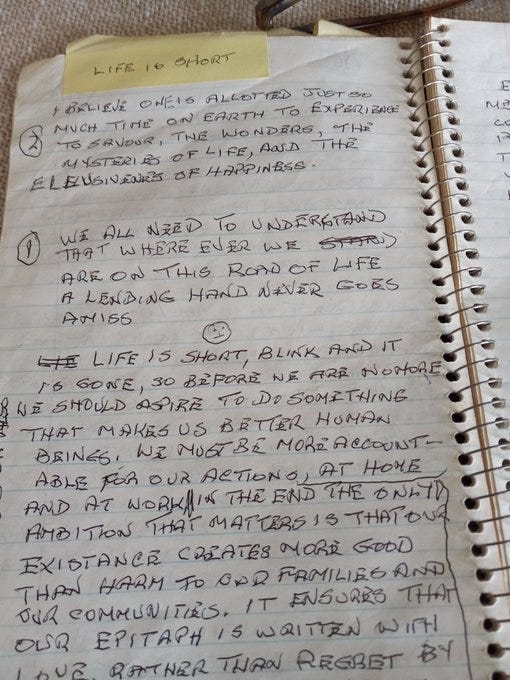I was diagnosed with rectal cancer a few weeks before Covid struck our world in 2020. The pandemic was an irrevocable force that altered the trajectory of every person alive on this planet. It was event as momentous as a Great War. Society was changed by it forever. Now, our reality is evenly divided into before and after it. We have been blistered from experiencing the pandemic whether it be physically or psychologically.
During that first year of COVID-19, I began writing letters to my dead father to explain what had happened to my world since his death. It was an examination of my life and his in during the time before Covid and what was to become of his “Last Stand” in a society transformed by a plague. It was a means for me to cope with the loneliness I endured whilst trying to recover from cancer. Here is a selection from chapter from it. I had intended to post an essay today on Cuba during the 1990s when it endured famine and I was working there. But it is taking longer . Hence this selection and for 24 hours a special on subscription prices.
Spring was reluctant to return during the first season of Covid. The light was too often grey, or the sky sullen and ready to rain. I wasn’t eating because it caused too much intestinal upset, and rapidly lost weight. I suffered from sleep deprivation, and when I fell unconscious, horrible nightmares attacked me.
I’d try to reassure myself that all this was temporary. It will pass, I said. “You are alive, be thankful, for that.”
But it’s hard to give thanks when surviving means multiple showers each day to help you piss or clean the shit off your body because cancer turned your intestines into a defective defecating unit.
What’s my new normal? I’d wonder each time I scrubbed my bathtub clean of the detritus from my body. To be honest, at the time, I didn’t think my being alive was going to last too long, anyway. I thought Covid was going to digest me. Then, I was just going through the motions until meeting my end. “Don’t die on your knees,” I’d admonish myself, “walk straight to your execution.”
Between the routine of trying to survive, I combed through the pieces of our lives after Peter died to try to understand what we did and why.
The genesis for making your life story public was formed in my head not long after Peter died. It was a means to ease my terror over fears that you too were going to die on me and leave me alone. You almost made good on my apprehension when I had to rush you to a Portuguese hospital just five months after Peter died.
The grief, your age, and a lifetime of smoking caught up with you on a day, we were supposed to go for a picnic on the Algarve coast. After breakfast that morning, you complained you couldn’t walk. You whimpered from the pain in your back right calf. As you had peripheral vascular disease, I knew you were in danger. I rushed you to a private hospital because I was afraid a state hospital might be more prone to give you a life-threatening virus caused by insufficient cleaning protocols.
While you were being treated at their A&E department, I was ushered to the billing department to put a hold on the visa card and told if the card could not take a 5k euro hold, “you must find your father another hospital.”
Every blood sample, bottle of water, doctor visit, nurse’s visit and meal were a line-item charge for your stay in that private hospital in Porto Mau. Daily you enjoyed a varied meal plan that sometimes included swordfish for dinner and imported organic Scottish oat porridge for your breakfast, always served on fine bone china. It was like staying at a Fairmount Hotel, except you couldn’t look online to view your burgeoning daily tab.
Often you would ask me, “Is this going to be expensive?” I’d always laugh it off and say, “It was as cheap as chips.” As far as I was concerned, the cost didn’t matter. I wasn’t going to quibble over euros when your life was on the line. I wasn’t going to be that person who held back on spending money they didn’t have to save a loved one. I wasn't going to allow you to die of insufficient funds or half-hearted advocation for your health.
Not money, not age, not your comorbidities were going to stop me from keeping you alive, and content until there was no more spirit left in you. I owed you that as my father and as the man who had been both a caregiver to Mum and then Pete. I pledged that whatever time you had left would be pleasant and purposeful. And fuck the expense. You were going to have that right to get as many kicks as possible at the can, damn everything, and anyone who would stand in the way of you taking a memorable last ride through life.
When you were in that hospital, I stayed at a cheap hotel nearby where I ate sandwiches for dinner bought from a local grocery and washed them down with Sagres beer.
I didn’t know if you’d survive your blood clot. I was still in shock from Pete’s death. I even made enquiries about where I could dispose of your body if you died in the Algarve. Our neighbourhood ex-pats told me they used a cheap and cheerful crematorium located in the hills if one of their own alcohol-sodden loved ones “popped their clogs.”
The idea I could lose you so soon after Peter’s death terrified me. If you died, then it would have meant I was severed to the last living link to those in my family who loved me. Your death would have then cast me emotionally adrift.
I was beginning to understand that if I wanted you to survive with a decent quality of life, I had to become more than your son. I had to become your comrade.
On the fifth day of your stay, your Portuguese doctor told me I could book our flight to Toronto. He said sternly that you were to leave directly, from the hospital, for the airport in Faro.
The following day, I booked a flight to Glasgow, which connected 24 hours later with a direct flight to Toronto. Before your discharge, I had to go to the hospital's accounts payable department and process a credit card payment of seven thousand euros. It was significant money for us. You had some savings, but I did not. Since I started full-time work twenty-five years before our move to Portugal, I’d had jobs with big titles and small pay.
When I put the credit card into the payment machine, I was petrified the bank would decline the payment. I had images of being forced to smuggle you from the hospital, in disguise because we couldn’t pay the bill or tying your bedsheets together and making you climb to the ground outside from the second floor of your hospital room.
However, the payment was accepted, and you and I were free to go to the airport. Still, I knew that we were rapidly descending into insolvency from that day on, and it was only a matter of time before we were bust. But you were alive. And my most important priority was to keep you on that right side of the ground whilst ensuring that you were happy to still exist.
As we left the hospital, you asked how much it had all cost, and I said, “Not much,” as I didn’t want to worry or upset you. The sheer amount we paid to keep you alive in Portugal taught me something you learned as a child without comprehensive public healthcare, the only ones who live a long life are the top ten per cent of income earners.
That morning, you were loaded via a scissor lift onto an Easy Jet.
“They think I am one of the bloody dinner trays,” you said as you were hoisted onboard.
A few hours later, we landed in Glasgow. In our airport hotel room, you told me not to worry, “I am not ready to die yet. Your old man will stick around for a while longer.” After that incident, each time you subsequently wound up in hospital, you told me the same thing - right up to your last hospital admission in Nov 2018, when you didn’t.
That night, as you slept, I remained wide awake, in terror at what had passed and what was to come. I was weak at the knee from my new responsibilities. I now had to be a true carer for you, not just a companion. To survive, I had to put your needs above mine.
You only had me to rely upon because all your friends were dead, Mum was dead and, Peter was dead.
Mournfully, I reflected on the past two years. We both tried so hard to keep Peter alive and despite all our efforts, love and hopes, he died. We tried to flit from our grief by returning to Portugal, just a few weeks after his funeral. But not the sun, the cheap wine, the sharing of pleasant company with Brits at local cafes could hide us from our unquenchable sorrow. Grief tailed our waking and sleeping moments, the way the Police Inspector Javeat hunted for Jean Valjean in Les Miserable, over a stolen loaf of bread. Those months after Peter died, we were broken people, defeated, and running off the fumes of emotions burning with grief. All our displeasure with our lives manifested itself in my drinking, your smoking, and us fighting each other and ourselves against the insurmountable pain of losing Peter. We simply could not reconcile that his life had slipped from our grasp as if his spirit were water falling from a tap and cascading into the drain of a sink where the evening’s washing up is done. You wanted to have done with it all because Pete dying was fate spitting at you, and mocking your longevity. You had endured the Great Depression, the Second World War, and a hardscrabble peace that saw you build a middle-class existence in a new country when you left England for Canada in the 1950s. You had paid your dues to the universe. You only asked destiny for normal happiness and the normal progress of life where sons bury their fathers, not the other way around.
I closed my eyes, and before I fell asleep, I only knew that I didn’t want you to go to your death alone, and angry with a world that didn’t even know you had once been alive. I would find a way for both of us to be redeemed.
As always, thank you for reading my sub stack posts because I really need your help Your subscriptions to Harry’s Last Stand keep the legacy of Harry Leslie Smith alive and me housed. So if you can join with a paid subscription which is just 3.50 a month or a yearly subscription or a gift subscription for 30. I promise the content is good, relevant and thoughtful. Take Care, John




